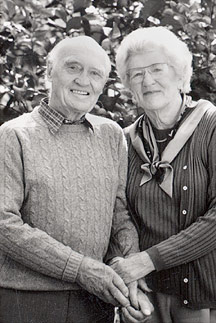Keith and Jean Kellogg:
An Uncommon Couple with the Common Touch
By Jeanne Lott
He grew up in a cereal factory; she grew up in her father's grocery
store. He went to a college founded for local lumberjacks; she attended
business school. Before they were married in 1968, they had known each
other for nearly 30 years. An apparently common couple, Janet ("Jean")
and W. Keith Kellogg II are anything but.
Gazing at the vintage Kellogg's cereal boxes that line the office walls
of their Rancho Santa Fe home, the Kelloggs remark on the children's faces
on the earliest boxes¾—the solemn and decidedly adult expressions
seem to reflect not only the state of childhood in the early 1900s, but
also the nature of the man behind the product, cereal magnate W.K. Kellogg.
Keith Kellogg remembers his grandfather as a stern man with firm notions
about childrearing, a man who valued the rare commodity of common sense
and passed his values on to his progeny. By the age of 12, under his grandfather's
tutelage, young Keith was at work in the Kellogg factory in Battle Creek,
Michigan, where he got a hands-on education in every department, from
product testing and development to the milling room, toaster ovens, and
packaged product.
In 1929, Keith was playing jazz saxophone at Philadelphia's Carlton
Hotel, but Grandfather Kellogg, who thought "jazz was evil music," suggested
that his grandson go to Chicago to bolster some of the family's struggling
business ventures. "I found 1,500 unemployed musicians in Chicago, so
I had to go to work," Keith recalls.
And go to work he did. His father, John, had pioneered the use of waxed
paper in 1915, an innovation known as "WaxTite" that was a hit with consumers.
Keith purchased the Kellogg packaging company, now known as General Packaging
Products, and put to use the hands-on, common-sense teachings of his granddad.
Today his son, William Keith Kellogg III, is its president.
Keith Kellogg has followed the senior Kellogg's lead in other ways as
well. W.K. Kellogg " invested his money in people," Keith notes. In a
newly industrialized America infamous for its unenlightened working conditions,
W.K. pioneered many progressive labor policies, including an eight-hour
work day, a minimum wage, a nursery for the children of his workers, and
a program of health care and physical exams for his employees.
In the 1930s, he funded the W.K. Kellogg Foundation, reportedly retaining
just a fraction of his fortune for his own use. In 1938, he gave his 800-acre
ranch in Pomona, his herd of registered Arabian horses, and an endowment
of $600,000 to the University of California, eventually establishing at
the ranch site Cal Poly Pomona. This relationship has continued throughout
the Kellogg generations. (Keith and Jean Kellogg provided funding for
Cal Poly's Art Gallery; Keith Kellogg was co-chair of its $50 million
capital building campaign in the late 1980s, and in 1994 he was awarded
an honorary Doctorate of Humane Letters degree.)
When Keith's father, John, died in 1950, the John and Helen Kellogg
Foundation was established. After Helen's death in 1978, the foundation
trustees began to distribute the $40 to $50 million in assets. Administered
by Keith Kellogg, the foundation has made several major gifts, naming
the Kellogg Graduate School of Management at Northwestern University,
establishing the School of International Studies at Notre Dame, and funding
programs at Cal-Poly, the Kellogg Cancer Care Center in Evanston, Illinois,
and the National Center for Excellency in Nursing at Rush-Presbyterian
Medical Center in Chicago, among other institutions.
As for their own giving, the Kelloggs eschew flashy projects for those
they think "make good sense." In fact, the couple's very first gift to
Scripps couldn't have been more sensible. Discovering at an early President's
Council luncheon that organ transplant researchers had no place to store
the blood, the Kelloggs bought them a couple of second-hand refrigerators.
Over the years, the two have been ardent supporters of Scripps Memorial
Hospital-Encinitas, "our local hospital," having provided major funding
for the emergency room, the rehabilitation and stroke center, and a senior
transport van.
"We like to help SMH-Encinitas in part because, after all, it is our
emergency facility," says Jean Kellogg, describing the genesis of their
involvement with SMH-Encinitas in 1977 when an allergy attack sent her
husband to Encinitas' emergency department.
At TSRI, their major gifts have included establishing an endowed chair
in chemistry, contributing funds to acquire land for the Lusk Research
campus, and making a significant commitment toward the Arnold and Mabel
Beckman Center for Chemical Sciences.
Most recently, the Kelloggs have supported TSRI's graduate college,
which was named the Kellogg School of Science and Technology last month
in their honor.
"We've gotten involved in Scripps to the depth that we have just because
it's so interesting," explains Keith. "We meet so many super people."
Go back to News & Views Index
|

TSRI has named its graduate college the Kellogg
School of Science and Technology in honor of Janet ("Jean") Kellogg and
W. Keith Kellogg II.
|



